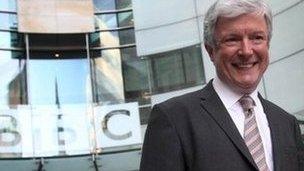BBC pay-offs to be capped at £150,000
- Published

The BBC is to limit pay-offs to its managers to a maximum of £150,000 following criticisms over the scale of redundancy packages paid to executives.
The new director general, Tony Hall, said the organisation "could not be tone-deaf" to what the public have said about large pay-offs.
The BBC was accused of "rewarding failure" over the £450,000 paid to Lord Hall's predecessor, George Entwistle.
Lord Hall said the BBC would consult on the plans with staff and unions.
"I appreciate that making changes to existing contracts is never easy. But it is to the great credit of the senior leadership team at the BBC that there is broad recognition of the need for change," he said, in a statement.
Public mood
Speaking about the proposals to MPs at the commons culture committee, Lord Hall said they represent a "fair way forward" for staff and for licence fee payers.
"I am committed to lowering senior management pay level, but I also want to get the best people. We are in a competitive market," he said.
The National Union of Journalists has welcomed the plans. "I hope this is the first of a number of measures by Lord Hall to cut waste at the BBC," said General secretary Michelle Stanistreet.
The measures, which are due to take effect in September 2013 will affect 250 people, Lord Hall added.
"We are consulting with staff and unions. It's a contractual change for senior managers and other members of staff, which we rightly have to consult on.
"I am confident we will get the agreement and people will see the sense of it. It is a matter of principle for me and something that responds to the public mood."
The proposals entitle senior managers to a redundancy package of one month's pay for each year of service up to a maximum of 12 months' salary or £150,000 - whichever is the lower.
Lord Hall said the measures bring the BBC into greater alignment with other industry bodies and the Civil Service, who have a similar pay cap.
Panorama defence
The BBC has come under fire for the severance packages, following a number of high profile departures from the corporation in recent years.
In September 2012, the former chief operating officer, Caroline Thomson left the BBC with a pay-off of £670,000, while the deputy director general Mark Byford received £949,000 when he departed in 2011.
In his first appearance before the culture committee since starting in the top job at the BBC earlier this month, Lord Hall outlined his priorities for the organisation, saying there was "too much bureaucracy" and it had to be dealt with in "a specific and concrete way".
He said he wanted to rebuild trust in what he called a "remarkably creative organisation", which needed to learn lessons from both the Pollard and Rose reviews.
Lord Hall said the risk assessment on Panorama concluded that it was better that the students "knew - but not too much"
Lord Hall was challenged by MP Ben Bradshaw who said the fact that no senior executive was sacked after the Pollard Report - which criticised the BBC's response to the Jimmy Savile scandal - gave the impression of the existence of "a management cadre who just look after each other".
Lord Hall said Helen Boaden, who was moved from her position as head of news after she was criticised in the report, would be "outstanding" in her new role as head of radio and described the move as "appropriate".
He added that he would personally take part in the recruitment of a new editor for the flagship current affairs programme, Newsnight. The appointment to the "phenomenally important job" would be made in a couple of weeks, he said.
Defending the broadcast of the recent Panorama programme on North Korea - in which BBC journalists filmed secretly during a study trip with 10 London School of Economics students - Lord Hall said he was "satisfied there had been clarity over what was going on".
"I don't want to inhibit difficult decisions being made," Lord Hall told the committee.
"If I had thought lives were being put at risk the programme would not have gone ahead."
- Published25 April 2013
- Published3 April 2013
- Published3 April 2013
- Published14 April 2013
- Published15 April 2013
- Published2 April 2013
- Published2 April 2013
- Published2 April 2013
- Published14 February 2013
- Published18 January 2013